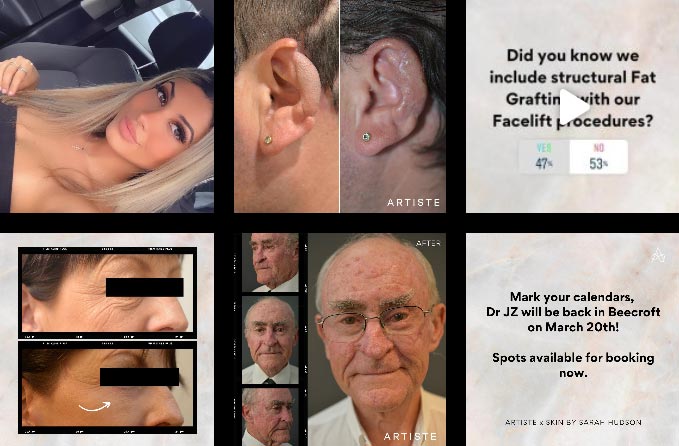Preparing for a Blepharoplasty Procedure
Model featured in photography
Preparing for a surgical procedure like blepharoplasty requires thoughtful consideration. Deciding to undergo this type of surgery isn’t simple, and understanding what to expect on the day of surgery is essential to feeling at ease and prepared. If you have already decided on pursuing blepharoplasty and want to ensure your day-of experience is as smooth as possible, this guide will provide insights and tips to help you prepare effectively and understand what to anticipate during your surgical journey.
How to prepare for an eyelid surgery
- Consultation: During your consultation, your surgeon will evaluate your medical history, examine your eyelids, and discuss your goals and expectations. This is also an opportunity to ask any questions or express any concerns you may have.
- Medical Clearance: Depending on your medical history, your surgeon may require you to obtain medical clearance from your primary care physician or specialist to ensure you’re qualified for the procedure. Your surgeon may also ask you to stop taking certain medications that can increase the risk of bleeding.
- Lifestyle Changes: If you are smoking, your surgeon will advise you to quit smoking several weeks before the procedure to prevent complications during recovery.
- Pre-surgery testing: Your surgeon may also require you to undergo pre-surgery testing, such as blood tests or an electrocardiogram (ECG).
- Arrange for a ride home: You will need to arrange a ride home after the surgery, as you cannot drive yourself.
What will happen on the day of the surgery?
On the day of blepharoplasty surgery, specific steps may vary depending on the clinic and surgeon. This general overview covers what patients can expect:
On the day of blepharoplasty surgery, the patient will undergo anaesthesia. The surgeon will make incisions in the eyelids’ natural creases to remove excess skin and fat and reposition the remaining tissue to create a refreshed appearance. The incisions will then be closed using fine sutures, and the patient will be taken to a recovery room. Swelling, bruising, and discomfort may occur but can be managed with pain medication and cold compresses.
Conclusion
Candidacy for surgery does not simply mean meeting certain qualifications; it refers to having completed all necessary assessments to ensure safety and suitability for the procedure. This includes a referral from a GP, a thorough medical evaluation, and screenings such as those for body dysmorphic disorder (BDD).
These steps help ensure that the patient is informed and prepared, both physically and mentally, for the surgical process.
It is essential that individuals understand these prerequisites and feel fully supported throughout the consultation and decision-making stages not just for a blepharoplasty surgery, but for other cosmetic procedures.
You may reach out to Dr. Jack Zoumaras for more information.
Disclaimer: At Artiste Plastic Surgery, our Plastic Surgeons led by Dr Jack Zoumaras have been trained to the highest possible degree. All surgery has risks and it is always advised to get a second opinion. Risks are very real and we cannot guarantee any result. Results are illustrated as a guide only. All risks are managed and any need for revision surgery or complications (1-5%) can be managed by our specialist plastic surgeons.
Any statements on how you will feel is based on Level V Evidence:
Level V: How you will feel after plastic surgery varies between individuals, depending on psychological and physical factors. Our internal research is based on how patients in our practice feel after surgery.
The blogs are not a substitute for a medical consultation and do not form as part of the doctor to patient relationship.
SHARE THIS ARTICLE
Sep25
Rhinoplasty Recovery Timeline: What to Expect Week by Week
Disclaimer: At Artiste Plastic Surgery, our Plastic Surgeons led by Dr Jack Zoumaras have been trained to the highest possible degree. All surgery has risks and it is always advised ...
Sep25
Are Non-Surgical Nose Jobs Worth It?
Are Non-Surgical Nose Jobs Worth it? Pros, Cons & Alternatives Are Non-Surgical Nose Jobs Worth it? Pros, Cons & Alternatives Are Non-Surgical Nose Jobs Worth it? Pros, Cons & Alternatives ...
ABOUT ARTISTE
Artiste Plastic Surgery is an Award Winning Specialist Plastic Surgery practice led by internationally trained Dr. Jack Zoumaras, Plastic Surgeon and Peer Reviewed Face Surgeon
Artiste offers the latest Cosmetic Surgical Procedures of the Face, Breast and Body, inspired from leading centres around the world.
STAY IN THE LOOP
Enter your email address below to receive updates on new articles and VIP access to promotions and special offers.
FOLLOW US ON INSTAGRAM
